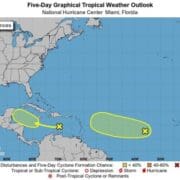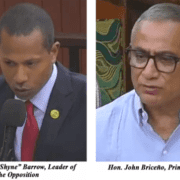Black Immigrant Daily News
Just one day after government announced that an agreement was reached to settle a claim brought by Waterloo Investments Holdings’ BISL, a January 2022 letter from Waterloo’s chairman, Lord Michael Ashcroft, in which he threatens legal action for a supposed breach of a UK-Belize treaty for the Promotion and Protection of Investments, was leaked. It appears to be a more aggressive tactic aimed at wresting approval of Waterloo’s proposed cruise terminal from GoB, and has entered the public domain just days before the scheduled public consultation on the new ESIA for the project takes place.
by Marco Lopez
BELIZE CITY, Wed. Aug. 24, 2022
While Waterloo Investment Holdings has been publicizing its submission of an updated Environmental and Social Impact Assessment (ESIA) for its proposed cruise terminal at the Port of Belize Ltd. and has been touting a public consultation on the proposal that is to be carried out on Thursday, September 1, 2022 at the Biltmore Plaza in Belize City, it seems that the company has been taking another, more aggressive approach behind the scenes—one that appears to be based on threats. Those threats hint at the economic pain that a Lord Ashcroft-financed legal team could cause the country through another lawsuit if Waterloo’s most recent multi-million-dollar enterprise in the country is not approved. Specifically, what has been leaked is a letter penned by the chairman of Waterloo, Lord Michael Ashcroft, who in that letter, threatened legal action against the Government of Belize if the Promotion and Protection of Investments 1982 agreement between the UK and Belize was not upheld by the government.
The letter was sent in January, following the rejection of the company’s first EIA by the National Environmental Appraisal Committee (NEAC) and Department of the Environment (DOE) late last year—a decision that had prompted the company to both lodge an appeal and to make accusations, of supposed solicitation of bribes by members of the NEAC—allegations that it never provided any further details about, even after being prodded by the Minister of Sustainable Development, Hon. Orlando Habet, to do so. And thus, the Ministry’s attempt to investigate Waterloo’s claim that “the NEAC recommendation accepted by the DOE … came following Waterloo’s refusal to pay bribes to certain NEAC members in exchange of ‘assisting’ Waterloo in answering NEAC’s question in the environmental screen process” stalled—because Waterloo made no attempt to substantiate the claims.
The letter sent by Lord Ashcroft nonetheless admonishes the government for the rejection of the first submission for environmental clearance tabled by Waterloo. Ashcroft’s letter stated that he and the UK shareholders of Waterloo are entitled to compensation under the Promotion and Protection of Investments 1982 agreement between Belize and the UK, since they have already invested upward of 5 million dollars in the project.
The letter finally invited GoB to “amicably settle the above dispute” within three months from the date of the letter or “the investors will be entitled to submit this dispute to international arbitration.”
This is not the first time that Ashcroft has used the UK-Belize treaty as a basis for seeking millions of dollars of compensation from GoB. A December 2009 AMANDALA article entitled, “Ashcroft’s attorneys invoke UK-Belize treaty to claim +$200 million,” reported that, in 2009. “By way of formal notice to Prime Minister Dean Barrow and Attorney General Wilfred Elrington, Dunkeld International Investment Limited (a Turks and Caicos company affiliated with British tycoon Michael Ashcroft) … indicated that it [was] invoking foreign arbitration for damages and losses of at least BZ$200 million and up to $400 million, following the nationalization of Belize Telemedia Limited (BTL) in August. The notice of arbitration makes reference to a treaty Belize signed with the UK back in 1982, with a 1985 amendment signed by Barrow, as Minister of Foreign Affairs, extending the treaty to the British territory of the Turks and Caicos.”
The letter sent by Ashcroft in reference to his most recent proposed venture—the Waterloo cruise port—was sent to the Prime Minister, Hon. John Briceño, in January of this year, as mentioned, and all indications point to steps being made to avoid yet another bout of litigation with the Ashcroft Alliance—with Waterloo’s appeal being heard, and a new ESIA being submitted to the DOE for review and being uploaded on their website. Waterloo is now knee-deep in a process to seek approval of its project, and a positive assessment of that project’s environmental and social impact—with public consultation scheduled for next week.
But the letter sent by Lord Ashcroft was issued before any final determination was made about the environmental impact of the project. And it also made no mention of the still-ongoing assessment of the social impact of the project. Neither does it acknowledge the gravity of any of the other considerations that would impact any decision by GoB—including the approval already given to two other cruise terminal projects (Stake Bank’s Port Coral and Portico Enterprise’s Port of Magical Belize) which would be operating, along with any proposed Waterloo port, within a small geographical area (an 8-mile radius) in the Belize District. What is seemingly suggested in the letter is that none of that matters—that perhaps the sheer fact that a UK investor is desirous of building a port obliges the government to issue an approval or risk violating this investment treaty. Questions have thus surfaced about what exactly are the terms of such a treaty—and whether it requires a country to disregard any environmental harm or social harm that could be caused in order to ensure compliance. Some in the public are wondering how Lord Ashcroft could be requesting payback for money he spent of his own volition to develop a project, the approval of which was never guaranteed. There is, in fact, an even more gnawing question in many Belizeans’ minds: were any assurances given to the Waterloo investor, either by this current administration, or the previous one?
The threat of litigation in the letter is real, and is particularly haunting because of the timing of the leak—just a day after the announcement that GoB would be paying Waterloo’s Belize International Services Limited (BISL) approximately $77 million dollars ($38.5 million US) after the company took its claim against the government of Belize through all the courts in the judicial system before getting a judgment in its favor at the Caribbean Court of Justice.
The Tuesday issue of the AMANDALA reported, “The company, BISL, was contracted in 1993 to manage two registries for Belize, the International Merchant Marine Registry of Belize (IMMARBE) and the International Business Companies Registry (IBCR), and was given an extension in 2003 to operate from that year until 2013. Two years later, in 2005, they were given a subsequent extension to operate from 2013 to 2020. The government, however, considered the 2005 extension unlawful after taking over control of the registries in 2013. The company then filed a claim on March 26, 2015, against the government for damages caused by a breach of the contract, but in October 2016, current acting Chief Justice Michelle Arana ruled in favor of the government, deeming the agreement to be unconstitutional, illegal and void. The case was taken to the Court of Appeal, where the Justices of Appeal dismissed the appeal and affirmed the ruling of then Justice Arana. The company finally got a favorable ruling after seeking redress at the highest appellant court, the Caribbean Court of Justice (CCJ), which ruled that the government acted unlawfully when it seized control of the two BISL registries. The court further ordered that damages be assessed by the Supreme Court and paid to the claimant in its judgment.”
This is just one example of how Waterloo has used its vast financial resources to fund relentless litigation in order to forward its business goals. Another legal battering at the hands of Waterloo would likely cost the Belizean public millions of dollars, making the proximity of the BISL settlement and the leak, or “release,” of the letter unsettling.
The fears about potentially devastating harm that could be caused by the project, however, are also very real. The issue of the placement of dredged material generated during the initial phase of construction of a cruise terminal at the Port of Belize was one aspect of the environmental impact of the project which caused the conservation community to sound alarm. Such dredging would be necessary to create an access channel to allow Oasis-class cruise ships to berth directly on the Belize City shoreline at the proposed cruise terminal—but there were concerns about possible damage to the Belize Barrier Reef. Following the outcry, the company had adjusted its plan to dump 7.5 million cubic meters of dredged material at an off-shore location (between English Caye and the Turneffe Atoll) and had suggested instead in an EIA addendum that it would dispose of the material at near-shore and on-shore locations.
“The volume of dredged material that will be generated by the dredging operation will require placement in onshore and nearshore locations,” the 2022 ESIA draft by Nextera Environmental and Engineering Consultants on behalf of Waterloo states.
The Belize Water Services, however, lodged a public complaint last year to the DOE regarding the placement of the new proposed dump site—which the company said is between its sewer ponds and the sea, and on top of an important mangrove wetland used for wastewater treatment.
“BWS is greatly concerned by the developer’s proposal to dredge and to place 7.5 million cubic meters of dredged material between the location of BWS’s sewer ponds and the Caribbean Sea,” the letter, sent in September 2021, states.
The company’s release goes on to state, “Based on the EIA report addendum, the near-shore and on-shore locations for placement of dredged material lie directly on top of the natural mangrove wetland used as part of the wastewater treatment process and extend well beyond the present-day Caribbean Sea shoreline. BWS anticipates a serious disruption of the established treatment process, as well as an increase in the challenges of meeting the regulated effluent limits for discharges from domestic wastewater treatment systems into Class 1 waters.”
In regard to the possible impact of such a project on our marine areas, the stakes are even higher because of the commitments the country made when it entered the Blue Bond financing arrangement with the Nature Conservancy (TNC)—an agreement which allowed the country to shed hundreds of millions of dollars of public debt by retiring the Superbond at a discounted rate that almost halved that debt. That arrangement also paved the way for many more potential opportunities for financing and investment based on preservation of the marine environment—all of which could be placed at risk if projects such as Waterloo are not properly assessed.
In fact, in a recent interview, the local representative for The Nature Conservancy in Belize, Julie Robinson, said that one of the 8 commitments made by the government of Belize as a part of the Blue Bond conservation funding agreement was to strengthen the EIA process.
“One of the commitments that government has made is to strengthen its environmental impact assessment regulations, and so it is a process. That process, that EIA process, needs to be revised; it needs to be strengthened,” Robinson said in an interview with KREM News’ Marisol Amaya.
She added, “What was brought to light when we were going through this process was that the EIA process itself needed to be improved upon. We needed to do things like, for example, look at the cumulative impact of projects rather than just on their own, because we are working in an area where you have connectivity, and if you have projects A, B, and C right next to one another, you are having a much greater impact, but the EIA process does not allow you to look at the cumulative impact.”
As a part of the Blue Bond agreement, the government is thus required to strengthen its EIA regulations before proceeding with any major development projects. No set timeline is set for the revision and update of the EIA regulations, but Robinson said that a Marine Spatial Plan being drafted by the parties will be used to guide developments of this nature.
The Blue Bond Agreement was signed in November of last year. It was at that time that the government made the commitments, which included the revision and update of the EIA regulations process. It is to be noted, however, that while Robinson indicated that TNC can advise the government to put a pause on the approval of new developments until the revision is completed, she pointed out that after a project has started, bringing it to a halt would open the door for legal action against the government. It is an indication that Blue Bond commitments must be considered BEFORE approval for any potentially harmful project is issued, rather than after a project has been given the green light.
“As part of the agreement that we have, we can only push as far as to say that it remains consistent with Belizean law. We can advise—so things like, when you are looking at Waterloo or any of the cruise ship developments, is the EIA process has already started, then perhaps a pause can be placed on it until we are able to look at the process. However, it is not necessarily something that can be stopped. I think if you were to put a stop order or something like that, the government would expose themselves to being sued because, according to the law, they are starting a process. What we are trying to make sure if that process is as robust as it possibly can be. So we could request—if that process is going through—we could request and say, ‘hey, let’s put a pause on this until we have had a chance to review that environmental impact assessment process and strengthen it to take into consideration’, like when you talk about the cruise ship, you are talking about three cruise ports that are all like in a within an 8-mile radius of one another,” Robinson said.
NewsAmericasNow.com











